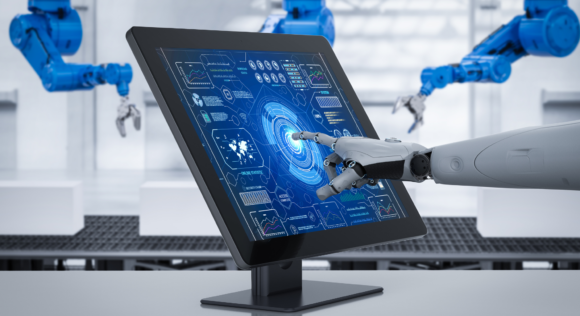
- iot_cwy2aq
- No Comments
- September 25, 2024
Future Trends in Process Instrumentation: Emerging Technologies Shaping the Industry
The Future of Process Instrumentation: Smart, Connected, and Data-Driven
Process instrumentation is undergoing a rapid transformation, fuelled by advancements in smart sensors, IoT integration, artificial intelligence, and automation technologies. For businesses in Dubai and across the Middle East, these innovations present significant opportunities to optimise operations, enhance efficiency, and meet evolving industry and regulatory demands.
At Ster IoT, we help industries embrace these emerging technologies by delivering smart, connected, and secure instrumentation solutions designed for tomorrow’s challenges.
Smart Sensors and Wireless Connectivity
Smart sensors are reshaping industrial operations by providing real-time insights, improved accuracy, and predictive maintenance capabilities. From oil and gas to pharmaceuticals and advanced manufacturing, organisations are increasingly adopting these solutions to minimise downtime and increase productivity.
Key Benefits of Smart Sensors:
Real-time data for faster, informed decision-making
Built-in diagnostics and self-calibration
Predictive maintenance that reduces unexpected failures
Wireless technology further enhances this transformation. With Industrial Wireless Sensor Networks (IWSNs), businesses can transmit data seamlessly across large facilities—eliminating cumbersome cabling, lowering maintenance costs, and improving flexibility.
IIoT and Cloud-Based Monitoring
The Industrial Internet of Things (IIoT) enables interconnected devices to collect, share, and analyse operational data in real time. By combining IIoT with cloud platforms, industries in Dubai gain the ability to monitor assets remotely, reduce operational costs, and unlock new efficiencies.
Advantages of IIoT in Process Instrumentation:
Remote monitoring and control across multiple sites
Lower operational costs through automation
Data-driven insights for process optimisation
Cloud integration allows companies to scale monitoring systems, centralise operations, and make smarter business decisions based on real-time analytics.
AI and Machine Learning: Smarter Insights, Greater Efficiency
Artificial Intelligence (AI) and Machine Learning (ML) are revolutionising process instrumentation. These technologies bring powerful capabilities such as predictive analytics, anomaly detection, and workflow optimisation.
How AI is Transforming Industries:
Predictive Maintenance: Anticipates failures before they occur
Anomaly Detection: Identifies irregularities for faster response
Process Optimisation: Reduces waste and maximises efficiency
At Ster IoT, we integrate AI-driven solutions into industrial systems to enhance productivity while minimising risks.
Advanced Process Control and Automation
The adoption of Advanced Process Control (APC) ensures smoother, more cost-efficient industrial operations. With Model Predictive Control (MPC), Digital Twin Technology, and Robotic Process Automation (RPA), industries are moving towards intelligent automation.
MPC: Predicts and adjusts process behaviour in real time
Digital Twins: Simulates physical systems for optimisation
RPA: Automates repetitive tasks to reduce errors and labour costs
Edge Computing: Real-Time Data at the Source
While cloud computing remains vital, edge computing is becoming critical for industries in Dubai that require instant decision-making. By processing data closer to the source, edge solutions reduce latency, improve response times, and strengthen security.
Benefits of Edge Computing:
Immediate insights with low latency
Enhanced cybersecurity by keeping data local
Lower bandwidth usage for large-scale operations
Cybersecurity in Connected Systems
As industries adopt digital instrumentation, cybersecurity becomes a top priority. At Ster IoT, we implement robust security frameworks to protect data and infrastructure against evolving threats.
Essential Cybersecurity Practices:
End-to-end encryption of sensor data
Multi-factor authentication (MFA) for secure access
Routine security audits to detect vulnerabilities
Sustainability and Energy Efficiency
Sustainability is at the heart of modern process instrumentation. Energy-efficient systems, renewable energy monitoring, and waste reduction technologies are enabling industries to meet environmental goals while cutting costs.
Green Instrumentation Trends:
Low-power, energy-efficient sensors
Optimisation of renewable energy production
Automation for reducing waste and improving resource use
Conclusion
The future of process instrumentation lies in smart sensors, IIoT, AI, automation, and sustainable solutions. For businesses in Dubai and the Middle East, adopting these technologies is no longer optional—it’s essential for staying competitive.
At Ster IoT, we deliver advanced process instrumentation solutions that empower industries to embrace digital transformation, drive efficiency, and secure long-term growth.
👉 Contact us today to discover how our IoT-driven instrumentation solutions can transform your business operations.
Key trades involved are carpenters, electricians, plumbers, and masons. Safety regulations are paramount, requiring protective gear and adherence to guidelines to prevent accidents. Advance technologies like Building Information Modeling (BIM) and prefabrication are revolutionizing the industry, enhancing efficiency and precision. Environmental sustainability is increasingly prioriti, with green building practices and materials gaining prominence.
The process begins with planning and design, involving architects and engineers who create blueprints and detailed plans. Pre-construction follows, which includes securing permits, site preparation, and material procurement.

